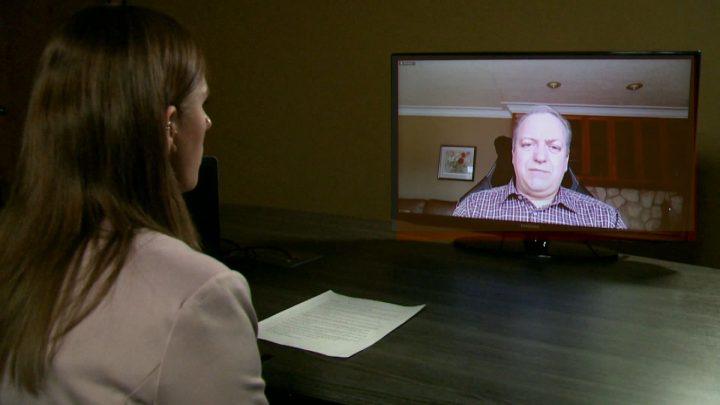Dr. Jeffrey Betcher is the critical care lead in Regina. Since the pandemic began, he’s helped plan for the surge of COVID-19 in hospitals.

He spoke with Global News about the state of Regina’s ICUs.
Q – If you could sum it up in one word or one sentence, what would you say is the condition of our ICUs right now in Regina?
A – In one sentence, when I think of the ICUs in Regina right now, they are being stressed and stretched to the max and beyond. But by the same token, all of the staff and all of the caregivers are rising to the occasion to meet that and doing a very good job.

Q – How are you doing throughout all of this working on the front lines?
A – It has been stressful on a number of levels. The first level is on the administrative level. As area lead, I was asked to be part of the planning to come up with a plan for when we would have a surge during this pandemic and the numbers that we were planning for were staggering. When you first look at the numbers, you just shake your head and think there is just no way that we can rise and meet this. But as time goes on and as the teams have gotten together, discussions have taken place and plans have started to come into place, you feel a little better with that part of it. Then the clinical part of it is I’m seeing things I’ve never seen in my life. To walk into one intensive care unit where the entire patient population in that intensive care unit has one disease is staggering.
Q – How does what we’re seeing right now differ from anything else we’ve seen in the pandemic so far?

Get weekly health news
A – If you were to walk into the ICU now and take a look at the age demographic of the patients, you’re seeing 20s, 30s, 40s, 50s, 60-year-old patients and they’re much sicker. And they get sicker quicker. Some of these patients that are coming in now have very young families, children that are in elementary school, some not even in school.
Q – Are many of these ICU patients on ventilators right now?
A – Pretty well all of them are. Equipment really isn’t a problem. We’ve got plenty of equipment. We’ve got plenty of ventilators to meet the demand. We have plenty of IV pumps and all of that. The bigger challenge is the human resource. Do we have the human resource that can meet this demand? So far we’ve been able to do that and it is hard and it is very taxing. But we have been able to do it.

Q – Are there concerns that the longer this goes on that we might not have those human resources to meet the demand?
A – That’s always a question for sure that we’re having to think about. Many of the staff are putting in many hours of overtime and many of them are tired, they’re getting tired. They’re working very hard and they’re doing a very good job. But it is starting to take its toll. Eventually, I think my concern is how sustainable is this, because it looks like we’re in this for the long haul.
Q – Is there a particular situation or one case that you constantly think about throughout all of this?
A – There are just so many of them. I think of times when I’ve had to tell someone on the phone that their loved one is dying and they can’t come in to say goodbye. Then there are those that die that have little children and there are the ones that are in the ICU that have spouses who are pregnant with their child. There are many different situations that are very, very psychologically taxing and very hard to process sometimes.
Q – What do think the public needs to know about the ICU that would make some people take COVID-19 more seriously?
A – I think people are listening a little too much to social media, which would say that this is a hoax because it’s not a hoax. It’s not. Not by any stretch of the imagination is this a hoax. We’re doing our part to help the people that need our help and we’re doing everything to plan for this. I would just make the plea to the public to do what you can to prevent it. Do the social distancing, obey the public health orders, wear masks, wash your hands, get tested when you’re symptomatic and the first opportunity you have, get vaccinated.










Comments
Want to discuss? Please read our Commenting Policy first.